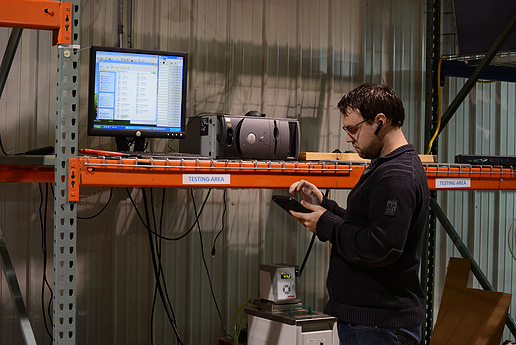A next-generation, micro-chip carrier for cooling is currently in development by Columbia, MO-based ThermAvant Technologies, LLC, and is already being tested by manufacturers of several major commercial and military satellite and aerospace systems, according to the company. This cooling solution will reduce the temperature of high-power satellite components to levels manageable by the spacecraft's thermal control system, which is beneficial because it improves processor reliability, while providing the opportunity to increase on-board processing,
The Air Force Research Laboratory (AFRL) and ThermAvant began researching the application of this technology as a result of an Air Force Small Business Innovation Research (SBIR) solicitation. The project called for reliable, high-conductivity heat spreaders; ThermAvant demonstrated the improved heat transfer properties of different structural materials (including aluminum, titanium, copper, and a copper molybdenum composite) embedded with oscillating heat pipe (OHP) technology. OHP-embedded chip carriers and heat spreaders will be used to transport heat dissipated by micro-chips to the spacecraft's larger thermal control systems.
This is a critical technology for space-based systems that will enable the deployment of higher temperature and power processors aboard satellite payloads. It can be used in both commercial and military satellite applications, as well as any high-performance land-based electronics. ThermAvant previously investigated the thermal performance tradeoffs of different fabrication processes for making OHP heat spreaders under a range of simulated real-world operating conditions. The company was co-founded by Dr. Bill Ma, a Professor of Mechanical Engineering at the University of Missouri.
During the testing, ThermAvant's prototype OHP-embedded heat spreaders provided an 84% reduction in the temperature rise across the heat spreader, when compared to current state-of-the-art technologies. This reduction in temperature provides many benefits, but the most important is the ability to increase the onboard computing power.
Current satellite processors are running at 10% of their operating capability as a result of insufficient thermal management. Reducing the junction temperature allows for increased processing capability (up to 10 times more) and increases the expected lifetime of the onboard chips. Additionally, the advanced manufacturing techniques developed under this effort will allow this higher-performing technology solution to be manufactured at a lower price point than competing technologies.
The company's improved methods for making OHP-based products has already demonstrated commercial promise to both space- and ground-based thermal management applications for electronics. During the first year of this Phase II SBIR, ThermAvant transitioned OHP-based thermal management solutions to four major defense contractors for six applications on platforms ranging from Army tanks to Navy ships and Air Force aircraft and spacecraft. In these applications the OHP-based thermal management solution performed 5% to 50% better than the status quo, and is on average approximately 20% less expensive.
 A ThermAvant employee is shown testing the company's oscillating heat pipe thermal management solution.
A ThermAvant employee is shown testing the company's oscillating heat pipe thermal management solution.
The Air Force SBIR and Small Business Technology Transfer (STTR) programs are mission-oriented programs that integrate the needs and requirements of the Air Force through research and development topics that have military and commercial potential. The SBIR and STTR programs provide more than $300 million in funding for R&D activities by small businesses annually, from the early stages of concept development until it transitions to military or commercial use.
Source: sae.org